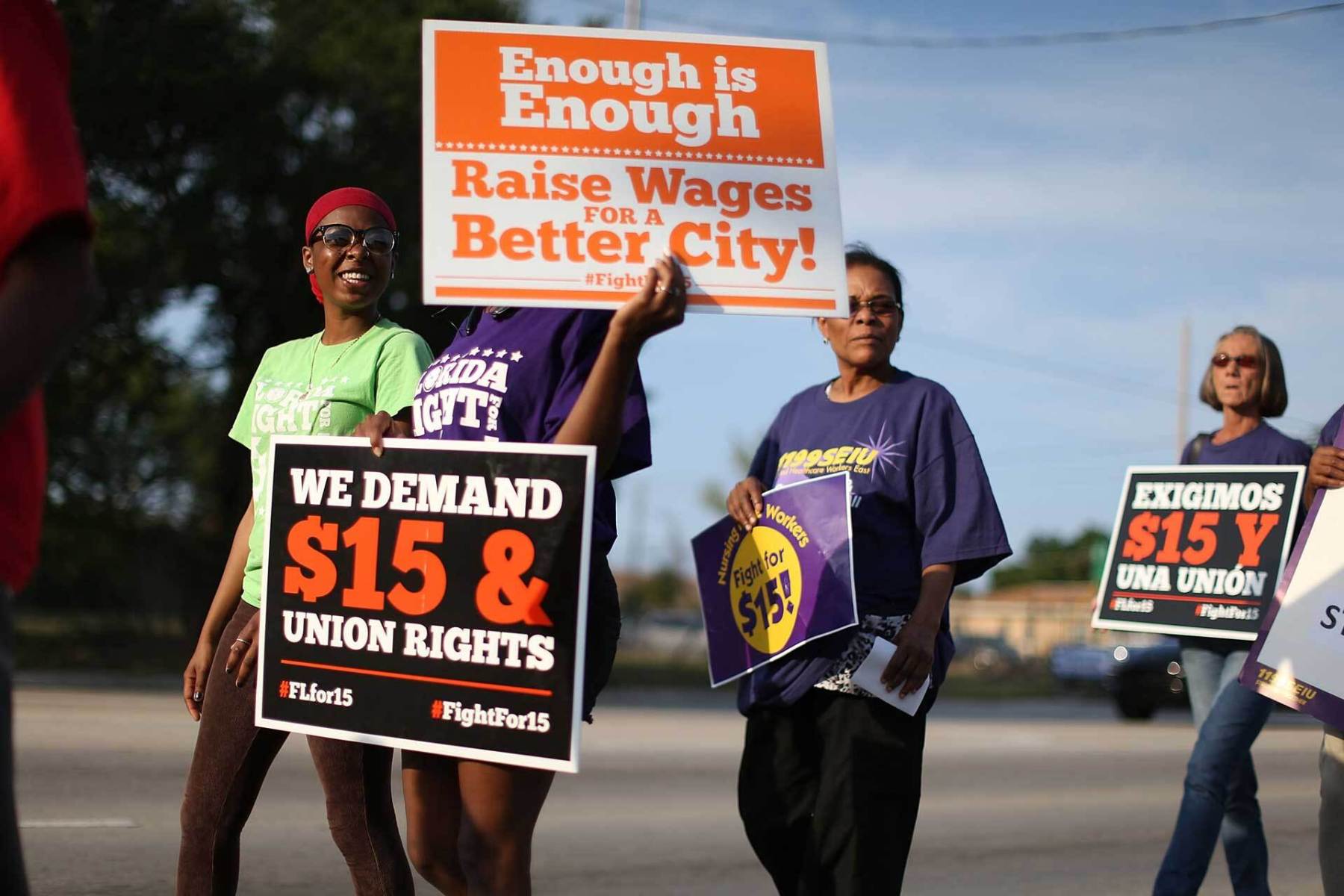We’re the only newsroom dedicated to writing about gender, politics and policy. Subscribe to our newsletter today.
In a year of unprecedented job loss for the nation’s low-wage workforce, Floridians voted to offer some relief in the form of a pay raise.
A constitutional amendment on the ballot to raise Florida’s hourly minimum wage from $8.56 today to $15 in 2026 passed with 61 percent of the vote — the supermajority of more than 60 percent Amendment 2 needed to become law.
The passage of Amendment 2 was a referendum on the state of Florida’s low-wage workforce, much of it concentrated in the hospitality field that endured the greatest losses due to the spread of coronavirus. Amendment 2 reached the ballot through petition after more than 800,000 signatures put it there.
John Morgan, the Orlando attorney who led the charge to raise the wage, said he did it this way because he felt politicians in Tallahassee were unlikely to pass any legislation to address the issue. The last time Florida raised its minimum wage, in 2004, it was also through a constitutional amendment ballot measure. Since then, the minimum wage has risen by less than $1 when adjusted for inflation.
That latest bump will first raise the minimum wage to $10 in September 2021, and then increase $1 a year until it hits $15 in 2026. The tipped wage will also rise from $5.54 today to $11.98 by 2026.
The majority of those benefits will be funneled to women, and especially women of color.
In Florida, 1.4 million women stand to get a pay increase, compared to 1.1 million men, according to an analysis by the Florida Policy Institute, a left-leaning think tank.
Minimum wage increases are considered one of the top policies to narrow pervasive gender pay gaps that still find women earning 82 cents for every $1 men earn, a disparity that is deeper for Black women, who earn 63 cents on the male $1, Native American women, who earn 60 cents and Latinas, who earn 55 cents to the male $1. In Florida, women overall earn 85 cents for every $1 men earn.
The minimum wage already contributes to greater parity among low-wage workers by raising the pay floor for all workers and making it more likely for those at the bottom of the payscale to make about the same. But a raising of that floor, which at the national level hasn’t budged in 11 years, could make “significant inroads” to eroding some of the most persistent disparities in pay that affect women of color the most, according to a report from the National Employment Law Project, which has argued that minimum wage hikes also lead to improved education and health prospects for children.
Those disparities are especially stark this year. Female workers account for nearly two-thirds of the 40 lowest paid jobs in the country, and Black women and Latinas are disproportionately concentrated in hospitality and service-sector work — the jobs that were mostly likely to get cut this year and the businesses that were most likely to close.
Sade Andrews, a 19-year-old McDonald’s worker in Tampa, said the increase will impact her immediately. She makes $9.50 an hour, and her pay will now rise to $10 by September 2021. Andrews, who lives with her mom and sister, said the jump will allow her to help her mom with the mortgage on a new home and car payments.
It would also help her return to school. Andrews took a break from college last year when it became too difficult to juggle with work. Her hope is to use the increased wages to pay for her classes.
As a Black Latina, she understands the barriers women in her community are already against. Since the pandemic hit, Andrews has been working extra hours to help her mom after her sister lost her job at a theme park. It hasn’t been enough.
“It’s hard for women because the men have it easier— they get paid a few cents more,” Andrews said. A pay increase sends a signal to those women: “They will know they are starting to see us, too.”
When Andrews cast her ballot for amendment 2 this year, it was her first time voting. She said it felt like she could “finally be heard.”
National movements like the Fight for $15, which has long been advocating for minimum wage hikes across the country, said Florida’s increase could be the impetus needed to get hikes passed in other states. Florida is the first southern state to enact a $15 minimum wage and the eighth state overall.
Business groups fought the increase, stressing that it’s not the right time to pass a wage hike when so many small businesses are struggling to return to pre-coronavirus levels. Some workers were against it, too, worried that restaurants would add service charges to the bill that would discourage guests from tipping.
Heather Parsons, a bartender at the Crab Trap, a restaurant on Florida’s panhandle, said there was “no way” employers like hers could afford to pay all employees with varying degrees of experience $15 an hour.
“Those who think this mandated wage hike is a good thing may have never been a server, or a hostess, or a bartender,” Parsons wrote in an editorial in Florida Today. “They do not understand our industry, or our workers who depend on jobs that provide a good income and a flexible schedule so we can raise our families.”
Carol Dover, president and CEO of the state’s restaurant and lodging association, the group that led the campaign against Amendment 2, said she knows “how catastrophic it will be for jobs and particularly for women.”
Dover said businesses will cut worker’s hours to save on costs and small, local businesses that can’t manage the new regulations will shutter. The cost of living, meanwhile, will go up.
“People increase their prices and now you’re making more money but everything costs more — everything — from your food, to daycare, to any commodity that you can think of,” Dover said.
A national study by the Congressional Budget Office found that increasing the federal minimum wage from $7.25, as it currently is, to $15 an hour could indeed lead to 1.3 million workers losing their jobs. At the same time, the increase would boost wages for 17 million workers and lift 1.3 million people — the majority of them women — out of poverty.
Other businesses say paying workers above minimum wage has other benefits, including improved retention rates and productivity.
At Love Life Cafe in Miami, co-owner Veronica Menin said she pays her entry-level dishwashers $12 an hour and pay goes up from there for servers, plus tips. The business, which employs about 40 people, has saved on hiring and training costs by offering more competitive pay.
“We couldn’t possibly live with the fact that we are increasing our profits and our staff is still barely making a living and still struggling to make ends meet at the end of the month,” Menin said.
And while she said she understands the concerns other businesses have about higher costs, Menin said business costs have already been going up and companies like hers have had to adjust. The tiered nature of the minimum wage increase will give business owners time to prepare for the hike, she said.
“Right now, it’s just so hard to find workers because people rather get an unemployment check than work for peanuts,” Menin said, “so I think overall it will improve the restaurant industry workforce and a lot of people don’t see that.”
When the amendment passed on Tuesday, Menin said it felt like a moment of optimism in an otherwise dark year.
“It’s about doing the right thing for those who deserve to be treated right,” Menin said. “We need to stop just thinking with our pockets and start thinking as a whole.”






